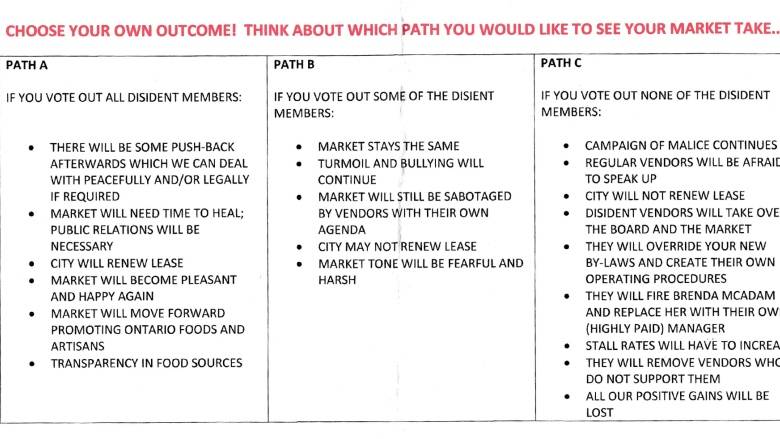Seven producers called for transparency among vendors
By Diego Flammini
Staff Writer
Farms.com
A group of Ontario producers are no longer welcome at their local farmers market.
Seven growers recently lost their booths at the Peterborough Farmers’ Market after they spoke out about a lack of transparency at the market more than a year ago.
Other vendors were reselling produce they’d bought at a wholesale food terminal as locally grown.
The producers’ concerns led to a CBC Marketplace investigation in 2017, which found similar practices occurring at other farmers markets.
Customers have a right to know the origins of the products they’re buying, said Astrid Manske, a honey producer from Indian River, Ont., and one of the seven evicted farmers.
“It’s the lack of honesty in the resellers that’s the problem,” she told Farms.com today. “There’s also an issue with the governance of the market not dealing with that problem.”
The growers were ejected in part by their peers.
Manske defended herself in front of the Peterborough & District Farmers’ Market Association (PDFMA) in January.
Members received a handout outlining the possible effects of the vote to exclude some growers.
The market would return to normal if all the producers were evicted, but there could be “bullying” or a “campaign of malice” if some or all of them remained, the flyer said.

Photo courtesy of Astrid Manske
At the time, the PDFMA board voted to allow Manske and the other vendors to continue operating their booths.
But the PDFMA overturned that decision and presented five growers with eviction notices on Apr. 24, said a joint statement from Manske, Julie Fleming and Erin McLean, all evicted producers.
Manske is now in a difficult position without a consistent market for her honey, she said.
“We’re sort of in limbo at the moment and we’ll have to find some other venues to keep on top of some income,” she said. “This is going to hurt for a bit until we can find some sort of balance. But I really just feel like I’m letting my customers down.”
PDFMA has developed a signage system.
Product identification signs tell customers how involved the vendor is with the production of their items.
“We Grow” – The farmer or vendor grows 100 per cent of the produce they offer.
“We Support” – The farmer or vendor doesn’t grow, raise or produce the product, but supports Ontario agriculture, education or local organizations.
“We Raise” – The seller raises 100 per cent of the product. This designation isn’t limited to animals for food consumption or domestic use.
“We Produce” – The seller produces 100 per cent of the product. This designation isn’t limited to food production, artisans, crafts and services.
PDFMA began working on the signage campaign before the CBC investigation, according to the Peterborough Farmers’ Market Facebook page.